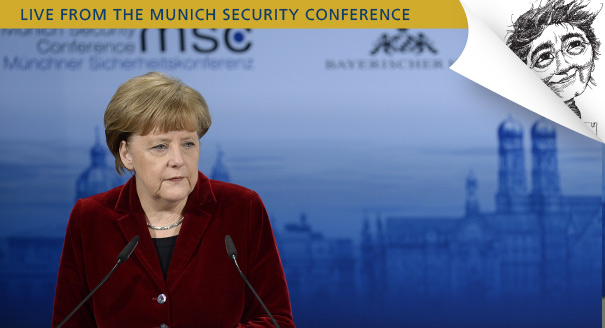It was one of the most eagerly awaited visits since the 2015 Munich Security Conference opened on February 6. The banqueting hall of the Bayerischer Hof was packed full with leaders, defense and foreign ministers, and security experts. They all wanted to hear what German Chancellor Angela Merkel had to say.
You could feel the tension and the sense of expectation when Merkel walked into hall. Would she bring any message of hope to end the bloody conflict now engulfing parts of eastern Ukraine? What would she say about Germany providing weapons to the Ukrainians—a debate now also taking place in the United States?
No, she could not guarantee anything, she said. Not the implementation of the September 2014 Minsk Protocol, an agreement to end the fighting. Not the new proposals she discussed with Putin, which apparently shifted the demarcation lines set out by the Minsk accord.
“Guarantees? I’d be very cautious,” she said. “The experience has not been a good one.” That was putting it mildly. Yet Merkel, who over many months has invested so much time and energy in trying to persuade Putin to end his support for the pro-Russian separatists in eastern Ukraine, is unwilling to give up on diplomacy—and just as unwilling to arm the Ukrainians.
Several conference delegates, including Toomas Hendrik Ilves, the president of Estonia, and U.S. Senator Robert Corker, chairman of the Senate foreign relations committee, asked Merkel what interest or incentive had Putin in ending the war if Germany opposed sending weapons to Kiev.
Merkel was unequivocal in her answer. “This conflict cannot be won militarily. That is the bitter reality. That is the bitter truth,” she said. “You see, I’m firmly convinced that the conflict can’t be solved with military means. More weapons will not solve it.” She was applauded.
#Merkel: The conflict in #Ukraine cannot be won militarily.Tweet This
Then she tried to put her convictions into context. If the West were convinced that military means could end the conflict or change the situation, then why didn’t it intervene when the East German Communists built the Berlin Wall in 1961, Merkel asked rhetorically.
“I was brought up in East Germany. I was seven years old [in 1961]. I saw the wall being built. But did anyone consider the idea of using force to stop it?” she asked. “No,” was her reply. Merkel explained that the West knew what the use of force would lead to. In the end, she added, the wall did fall. Communism did collapse. Eventually. But not because of force.
Merkel knows that her position on arming Ukraine is not welcomed by some U.S. representatives or by those from some European countries, particularly the Baltic states.
But her other big worry, apart from the growing number of casualties in eastern Ukraine, is the vulnerability of Petro Poroshenko, the president of Ukraine, who was sitting in the front row in the conference hall. On February 5, he had held many hours of talks in Kiev with Merkel and François Hollande, the French president.
“Poroshenko ran a big political risk in accepting the Minsk agreement, in accepting the status of Donetsk and Luhansk,” Merkel said, referring to the two regions of eastern Ukraine that were given greater autonomy under the accord. She has no illusions about the pressure he is under.
#Merkel has no illusions about what Putin has done to Europe's security order.Tweet This
Nor has she any illusions about what Putin has done to the security order built after the end of the Cold War and, particularly, to the Helsinki Final Act, which was signed forty years ago with the aim of improving relations between the Communist bloc and West. Under that agreement, the Soviet Union signed up to recognize the inviolability of borders and the principle of noninterference in the internal affairs of another country.
But with Russia’s 2014 invasion of eastern Ukraine and annexation of Crimea (not to mention its 2008 invasion of Georgia), Merkel said Moscow had “violated those principles. It has broken its commitment to the Budapest Memorandum,” she said, referring to the 1994 agreement under which Ukraine gave up its nuclear weapons and, in return, received assurances against threats to its territorial integrity.
“Who would give up their nuclear capability if their territorial integrity were not respected?” Merkel asked. Yet she could have added that the Western signatories of the Budapest Memorandum, the United States and the UK, as well as other European countries, allowed Russia to run roughshod over the deal. Western countries didn’t live up to their commitments either.
Merkel has now set out the German position. It is hard to see her changing her mind. She has no illusions about Putin or about the efficacy of hard power.
Her speech in Munich and her answers to the follow-up questions will not please those who believe that a democratically elected government committed to trying to modernize its country and bring it closer to the EU should be, and deserves to be, defended. But Merkel has spoken. Putin, no doubt, listened carefully to what she had to say.








